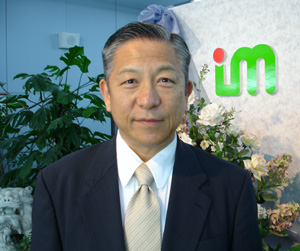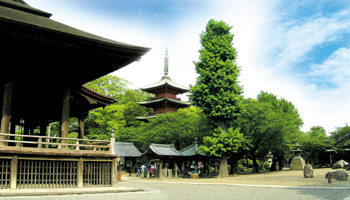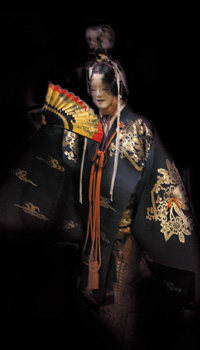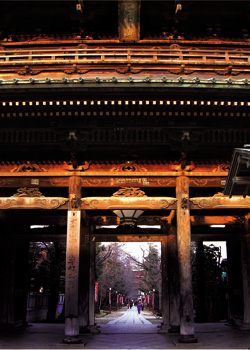Harnessing the Buddhist Work Ethic
Back to Contents of Issue: June 2005
|
|
||||||||||||
|
by Terrie Lloyd |
||||||||||||
 Itsuro Mizukami became interested in Buddhism by accident, when as a town planner and developer in his 30's, he was asked to review a housing development for the Chiba Prefecture Government. Among the planned amenities was an independent cemetery. Researching the field, he found that cemeteries are either owned by companies or temples, and he became intrigued by the dynamics of the business sector. He started meeting senior monks of temples near his home, and slowly became involved in their mainstay business -- that of leasing and maintaining cemetery plots. Itsuro Mizukami became interested in Buddhism by accident, when as a town planner and developer in his 30's, he was asked to review a housing development for the Chiba Prefecture Government. Among the planned amenities was an independent cemetery. Researching the field, he found that cemeteries are either owned by companies or temples, and he became intrigued by the dynamics of the business sector. He started meeting senior monks of temples near his home, and slowly became involved in their mainstay business -- that of leasing and maintaining cemetery plots.
Since his involvement grew from a desire to preserve almost 1,500 years of religious culture that is Buddhism in Japan, he entered the headstone ("boseki") manufacturing and sales business -- dealing only with temples and becoming their trusted partner. Twenty-three years later, Mizukami is the leading trader of headstones for temple-run cemeteries in Japan, selling one thousand headstones a year. And now he is girding for the next surge of growth: entrance into the funeral and temple property management business. There's Money in Headstones Headstones? Is there money in that? You would be surprised. Overall in Japan, according to Mizukami, the headstone market alone is worth a staggering ¥300BN* (US$2.7BN). Last fiscal year, ending March 2005, the 16 branches of Mizukami's I M company enjoyed sales of ¥1.5BN (US$14MM) -- almost exclusively in headstone orders, and had a profit margin of better than 15 percent. This current year, he expects sales to increase 25 percent to ¥2BN and profits to hit ¥300MM. Next year, the sales target will be ¥5BN. His company is the leading supplier of headstones to the more than 80,000 Buddhist temples in Japan, particularly temples associated with the Mahayana school, which includes the majority Jodo sect, but also Jodo Shin, Rinzai, Nichiren, and others. Through steady affiliation and persistence, Mizukami has created a huge captive and yet supportive network of temples, which automatically send clients to him whenever there is a death in the neighborhood. The Japanese cemetery and associated services business is divided into two types of players: temples and independent operators. The temple sector is tightly run, and as the biggest temple-related player for headstones, Mizukami likes it that way. Although there are other major firms in the headstone market, including outfits such as Onoya, Nichiryoku, Sudo, and Nagisa, being in the independent sector they are far more exposed to competition and price cutting. This means that they have to handle high volume to make their margins, which exacerbates the difference in quality of service and product compared with that of temples. Not only do such firms operate in a more competitive market, but to secure cemetery real estate, they frequently have to also become the operator as well, which means committing to large real estate purchases costing up to ¥1BN ($9,200,000) -- just to secure a new tranche of business. Mizukami, on the other hand, can sell his headstones independent of cemetery operations, and sells quite happily on a single unit basis. So his need for capital is very low and he has the flexibility of how to use it -- rather than just servicing long-term bank loans. 200,000 Potential Customers a Year We asked Mizukami just how big the headstone business is. He tells us that there are probably about 30,000 headstone suppliers in Japan, but the sector is consolidating rapidly and most of the small family operations are dying out. He goes on to say that the customer base can probably be calculated. For example, he believes that while 60 percent of Japanese choose to be interred (actually, they are cremated; the ashes interred) in independent cemeteries, still about 40 percent prefer to be interred in temple grounds, as their ancestors were before them. Of these, about half already have family plots, so based on a death rate of 8.9 per 1,000 in 2003 (Japan Statistics Bureau), the likely customer base for temple plots is about 200,000 people a year.
You might have heard that Japan is running out of burial plots. According to Mizukami, that is not true -- with the possible exception of downtown Tokyo. Most temples, with appropriate real estate management, still have large areas of unused land, and are able to accommodate the current national death rate. He conceded that independent cemetery operators are finding it difficult to find new real estate, but says that is more a matter of objections to the town council planner from neighbors than because of an actual shortage of suitable land. Luckily for Mizukami, many of those people favoring temple plots are basically well-off traditionalists or newly rich city people trying to reestablish their roots after their parents had moved to Tokyo. For these people, wanting a quality memorial is important, as they establish their own family heritage and status. Another important demographic is that of older people living alone, after the death of a spouse or a divorce -- as many as 3MM people in Japan at present. These people have the time to reflect, and typically become very concerned about their own funerals and tidying up the lose ends after death. They also tend to want to leave a personal memorial to give their lives some meaning. However, while a loyal customer base like this has been great and with plans to seize more than 5 percent of the temple-related headstone market in the next two years, Mizukami can see he has to start planning for further growth. His strategy is threefold: better marketing -- to increase both his and the temples' market share; overseas tie-ups; and general expansion into other temple-related businesses. On his short list are such businesses as event management, temple property management, building maintenance, and outsourcing of skilled staff. Dispatching Temple Carpenters In terms of improving marketing, mainly by educating the populace, Mizukami has come up with a "Funeral Plaza" concept ("Fyu Plaza" as he calls it), which will be a one-stop funeral management shop for people who are not affiliated with any temple and no longer know what is involved in conducting a funeral. Mizukami plans to open up 100 such information centers all over Japan in the next three years, operated by a subsidiary, and sees them as the key in creating personal relationships with customers that the temples wouldn't otherwise come in contact with. Among his planned services are the management and production of a funeral at a fixed cost, subcontracted to his nearest affiliate funerary home; temple rental; monk services; cemetery plot procurement and maintenance; and follow-up memorial services. He plans to offer city dwellers a hybrid lay-by/insurance payment plan, priced at just a few thousand yen per month, to let customers receive a full and honorable burial, even if the customer passes away before the plan is fully paid up. Mizukami's temple-related building maintenance business is quite interesting, and is a good reflection of how he has combined his inside knowledge of temple operations and personal network of head monks into win-win revenue. Many of the wooden temples in Japan are quite ancient and the building techniques needed to support such large structures using traditional means are both complex and arcane. Unfortunately, as renewal schedules fall due, temples around the country are finding that the expertise to repair and renew their buildings is in drastically short supply. Against this background, Mizukami has launched a specialist carpenter dispatch service, which sends skilled tradesmen all over Japan to work on venerable buildings. The tradesmen are also in demand by private building owners as well. Nationwide expansion of his business has been built on Mizukami's personal touch. As a very approachable and knowledgeable lay person, he travels the country a lot and is on a first name basis with many of the nation's leading monks. He is careful to maintain his client-partnership relationships and hints that he will soon have to establish a CRM system to keep track of them all. This is an industry which is very highly politicized, so remembering who has done what and who supports whom is very important! Changing Attitudes It's not hard to imagine that as Japan has modernized, people have lost interest in religion and become obsessed with material things. Contrary to what you might think, however, it is the aging baby boomers who seem to be the furthest from the values of Buddha, even as they might be seeking a resting place after their death. Somehow, the chase for personal and national security has loosened their ties with divinity. Mizukami laments how the worst litterers of temple grounds seem to be men in their 60's, who have little or no respect for the spiritual, and attend the festivals out of obligation. He comments, "When they throw their cigarette butts and wrappers on the grounds, I can scarcely believe their lack of piety." Perhaps more importantly than cigarette wrappers is the fact that a disinterested community is slowly starving the Buddhist temples of their income, and mergers or closings are becoming ever more common. Mizukami sees his role as being one of helping to reverse this trend and so building on his lucrative base in headstones, he is now convincing head monks around the country to let him help them market their facilities for more general community events. Ideas range from going back to core activities, such as hosting local festivals, to having art displays and evening choir events. He revels in the idea that having come to the temples for profit, he is now in a position to reciprocate.
Getting Your Own Temple Plot The procedure for getting a family plot is quite simple. Providing space is available, a local family need simply apply to the temple for a perpetual lease. They pay once only, in a lump sum. For the Nichiren sect's Hokekyo Temple, located near Nishi Funabashi, and one which Mizukami has a strong affiliation with, the going rate for a one-square-meter plot is about ¥1.3MM, then about ¥1,000 a year to get the plot maintained by temple monks -- although this second charge is not compulsory. We asked Mizukami if there is ever a situation where a family can lose its plot. According to him, there are two possibilities. First, if the family line in the area dies out, then the plot is returned to the temple. Second, if the plot is not maintained properly, the temple will ask the family to improve it, but if for some reason they can't -- a not so unusual occurrence after some generations -- then the temple authorities move the contents of an individual family plot to a communal one which takes up a lot less space. In this way, new free space comes up even in full cemeteries on a regular basis. A cemetery plot can stay with the family for generations, and because people understand the permanence of the location, they tend to want permanent memorials, hence the healthy business for I M company in elaborate and expensive headstones. Mizukami is quite open about the expense and profit available in the headstone business. In his mind, he feels that his customers are buying an art object on which to focus their emotions rather than a commodity and as such, who would want a second-grade effort for such a purpose? Mizukami sells about 70 - 100 headstones a month, at prices ranging from ¥2 - ¥4MM each. After import, carving, polishing, and installation, his margin is about 12 percent on each stone, with other services accounting for the remainder of his profits. Since Buddhism is a religion which values subdued good taste, most of Mizukami's headstones are beautiful natural pieces of stone rather than gaudy statements -- although he still gets calls for dragons and other intricate images. This means that the type of stone, its texture, and natural patterning are very important in determining price. For this reason, Mizukami imports from all over the world, including China, India, Italy, Norway, Sweden, Finland, Portugal, and Uruguay. The Foreign Connection Mizukami gets most of his headstone shaping work done in China, in a small stone- crafting town a three-hour drive from Xiamen (pronounced "Shamen") in Fujian Province. He travels there frequently and has started to see opportunities to help Chinese temples develop the same revenue streams from affiliated or fully owned cemeteries that Japanese temples enjoy. Indeed, not just China, but also in English-speaking countries as well, Mizukami sees strong merit for churches to reclaim their governance of the cemetery business -- lost somehow over the last 100 years. Mizukami is already talking to potential Chinese partners about a business tie-up and expansion into that country.
|
||||||||||||
Note: The function "email this page" is currently not supported for this page.








